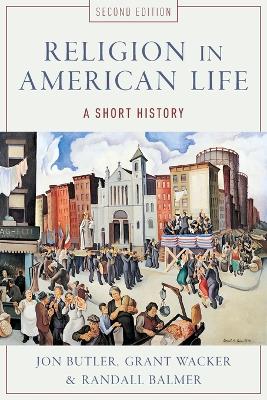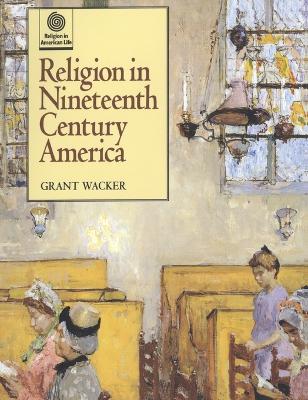Religion in American Life
4 total works
Religion in American Life
by Jon Butler, Grant Wacker, and Randall Balmer
Published 26 November 2007
"Quite ambitious, tracing religion in the United States from European colonization up to the 21st century.... The writing is strong throughout."-Publishers Weekly (starred review)
"One can hardly do better than Religion in American Life.... A good read, especially for the uninitiated. The initiated might also read it for its felicity of narrative and the moments of illumination that fine scholars can inject even into stories we have all heard before. Read it."-Church History
This new edition of Religion in American Life, written by three of the country's most eminent historians of religion, offers a superb overview that spans four centuries, illuminating the rich spiritual heritage central to nearly every event in our nation's history. Beginning with the state of religious affairs in both the Old and New Worlds on the eve of colonization and continuing through to the present, the book covers all the major American religious groups, from Protestants, Jews,
and Catholics to Muslims, Hindus, Mormons, Buddhists, and New Age believers. Revised and updated, the book includes expanded treatment of religion during the Great Depression, of the religious influences on the civil rights movement, and of utopian groups in the 19th century, and it now covers the role of
religion during the 2008 presidential election, observing how completely religion has entered American politics.
"One can hardly do better than Religion in American Life.... A good read, especially for the uninitiated. The initiated might also read it for its felicity of narrative and the moments of illumination that fine scholars can inject even into stories we have all heard before. Read it."-Church History
This new edition of Religion in American Life, written by three of the country's most eminent historians of religion, offers a superb overview that spans four centuries, illuminating the rich spiritual heritage central to nearly every event in our nation's history. Beginning with the state of religious affairs in both the Old and New Worlds on the eve of colonization and continuing through to the present, the book covers all the major American religious groups, from Protestants, Jews,
and Catholics to Muslims, Hindus, Mormons, Buddhists, and New Age believers. Revised and updated, the book includes expanded treatment of religion during the Great Depression, of the religious influences on the civil rights movement, and of utopian groups in the 19th century, and it now covers the role of
religion during the 2008 presidential election, observing how completely religion has entered American politics.
Written from the perspective of the various denominations that thrived in the 19th century, this comprehensive survey of the middle period in America's religious past actually starts a little earlier, in the 1780s. In the aftermath of the American Revolution, the citizens of the newly-minted republic had to cope with more than the havoc wreaked on churches and denominations by the war. They also tasted for the first time the effects of two novel ideas incorporated in
the Constitution and the First Amendment: the separation of church and state and the freedom to practice any religion.
Grant Wacker takes readers on a lively tour of the numerous religions and the major historical challenges-from the Civil War and westward expansion to immigration and the Industrial Revolution-that defined the century. The narrative focuses on the rapid growth of evangelical Protestants, in denominations such as Methodists, Presbyterians, and Baptists, and their competition for dominance with new immigrants' religions such as Catholicism and Judaism. The author discusses issues ranging from
temperance to Sunday schools and introduces the personalities-sometimes colorful, sometimes saintly, and often both-of the men and women who shaped American religion in the 19th century, including Methodist bishop Francis Asbury, ex-slave Sojourner Truth, Christian Science founder Mary Baker Eddy,
and evangelist Dwight L. Moody.
Religion in American Life explores the evolution, character, and dynamics of organized religion in America from 1500 to the present day. Written by distinguished religious historians, these books weave together the varying stories that compose the religious fabric of the United States, from Puritanism to alternative religious practices. Primary source material coupled with handsome illustrations and lucid text make these books essential in any exploration of America's diverse nature.
Each book includes a chronology, suggestions for further reading, and index.
the Constitution and the First Amendment: the separation of church and state and the freedom to practice any religion.
Grant Wacker takes readers on a lively tour of the numerous religions and the major historical challenges-from the Civil War and westward expansion to immigration and the Industrial Revolution-that defined the century. The narrative focuses on the rapid growth of evangelical Protestants, in denominations such as Methodists, Presbyterians, and Baptists, and their competition for dominance with new immigrants' religions such as Catholicism and Judaism. The author discusses issues ranging from
temperance to Sunday schools and introduces the personalities-sometimes colorful, sometimes saintly, and often both-of the men and women who shaped American religion in the 19th century, including Methodist bishop Francis Asbury, ex-slave Sojourner Truth, Christian Science founder Mary Baker Eddy,
and evangelist Dwight L. Moody.
Religion in American Life explores the evolution, character, and dynamics of organized religion in America from 1500 to the present day. Written by distinguished religious historians, these books weave together the varying stories that compose the religious fabric of the United States, from Puritanism to alternative religious practices. Primary source material coupled with handsome illustrations and lucid text make these books essential in any exploration of America's diverse nature.
Each book includes a chronology, suggestions for further reading, and index.
Many people believe that the piety of the Pilgrims typified early American religion. However, by the 1730s Catholics, Jews, and Africans had joined Native Americans, Puritans, and numerous other Protestants in the colonies. Jon Butler launches his narrative with a description of the state of religious affairs in both the Old and New Worlds. He explores the failure of John Winthrop's goal to achieve Puritan perfection, the controversy over Anne Hutchinson's tenacious
faith, the evangelizing stamina of ex-slave and Methodist preacher Absalom Jones, and the spiritual resilience of the Catawba Indians. The meeting of these diverse groups and their varied use of music, dance, and ritual produced an unprecedented evolution of religious practice, including the birth of
revivals. And through their daily interactions, these Americans created a living foundation for the First Amendment. After Independence their active diversity of faiths led Americans to the groundbreaking idea that government should abandon the use of law to support any religious group and should instead guarantee free exercise of religion for everyone.
faith, the evangelizing stamina of ex-slave and Methodist preacher Absalom Jones, and the spiritual resilience of the Catawba Indians. The meeting of these diverse groups and their varied use of music, dance, and ritual produced an unprecedented evolution of religious practice, including the birth of
revivals. And through their daily interactions, these Americans created a living foundation for the First Amendment. After Independence their active diversity of faiths led Americans to the groundbreaking idea that government should abandon the use of law to support any religious group and should instead guarantee free exercise of religion for everyone.
Presents the role of religion in early American life as well as the influence of various groups on American religion during the Colonial era.


